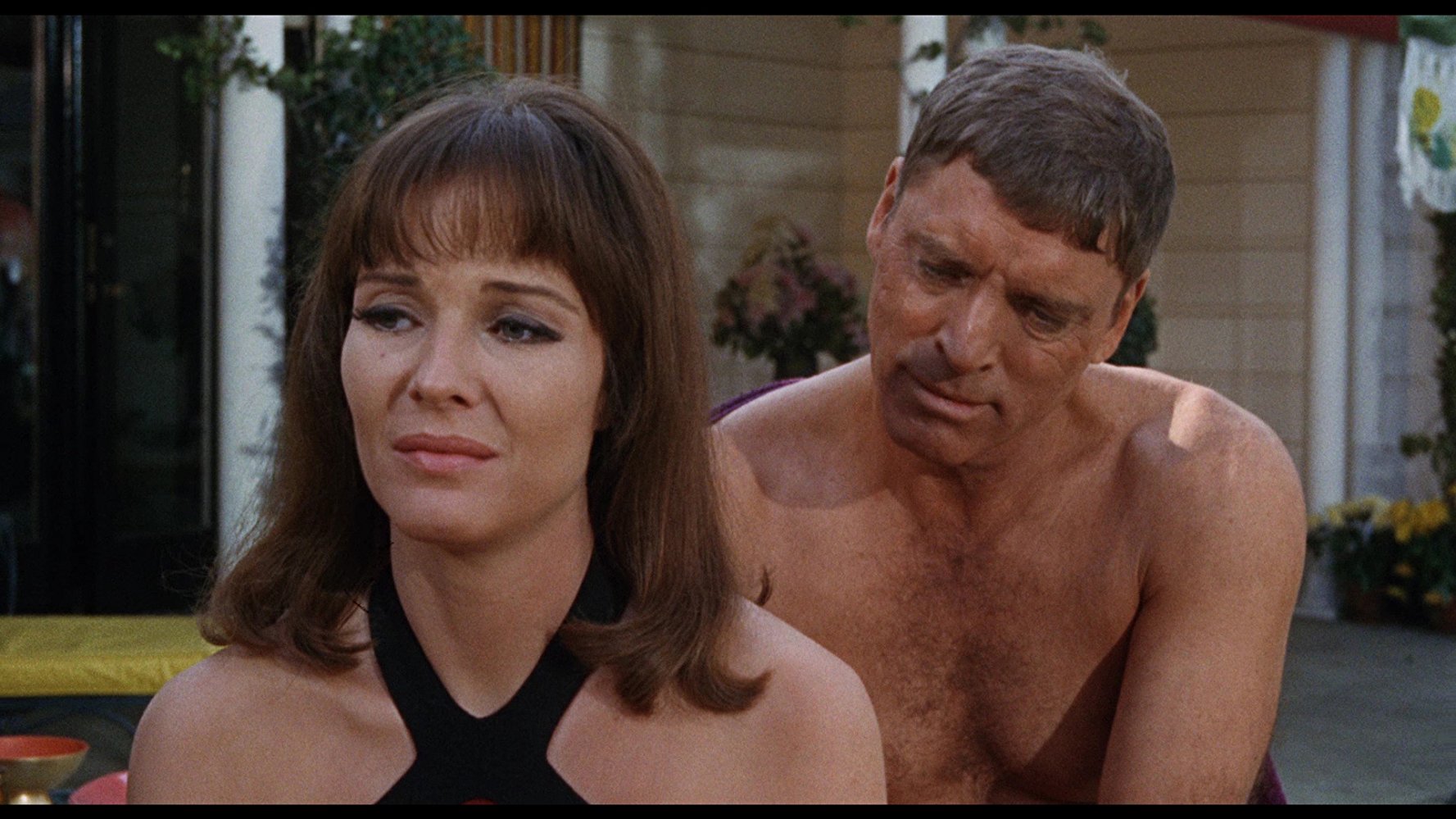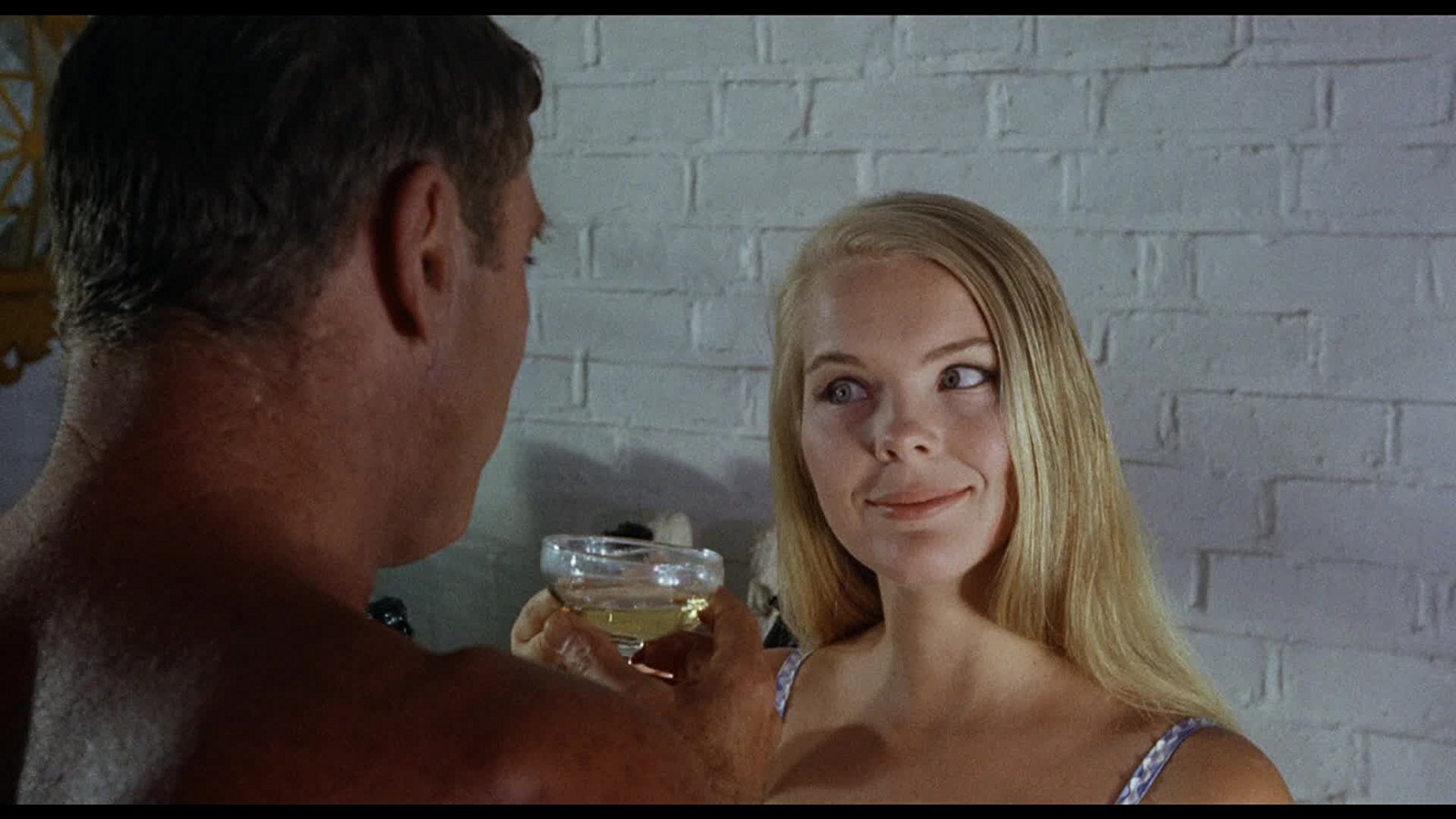Inspecting Hidden Gem #1: The Swimmer
The reviews in this series are meant for those who have already seen the films in question.
The Swimmer
U.S.A. / Columbia Pictures Corporation - Horizon Pictures - Dover Productions / 1968 / Technicolor / 95 minutes / Aspect Ratio: 1.85:1
One day in the early summer of 1968 at a mere 13 years old, I embarked on a movie going expedition not totally unlike the main character's in the film I was about to see: The Swimmer. Even at that early age, I had developed an insatiable passion for the movies and the premise of this one sounded right up my alley or perhaps more apropos, "... my river." Before taking a number of buses to arrive at the exclusive theatre where the film was playing, I read a review in the Los Angeles Times by Charles Champlin describing its story about an East Coast suburbanite who, one fine day after suddenly appearing at a friend’s lavishly appointed home clad only in swimming trunks, decides to “swim home” via his many neighbours’ pools.
I was an extremely shy lad but had a strong affinity for those outgoing adventurous pioneers compelled to forge their own exploratory path as was my determination to vicariously experience them. There was nothing I enjoyed more than venturing out to a movie theatre alone, to sit in the dark and absorb stories of people without the need, or possibility even, of them requiring something from me. So, that one early afternoon, at a plush theatre in Beverly Hills, where I had previously seen and been awed by Planet of the Apes, I sat with only a few others in attendance and watched this strange, hypnotically engaging, beautifully photographed and sumptuously scored film about Ned Merrill and his dream-like quest (both as Ned envisions the journey and as his story appeared to me) to swim these string of swimming pools he christened as the “Lucinda River” after his wife. Even today, 50 years later to the month, this film continues to haunt me having had a profound effect on my life and as I’ve since discovered, on others as well.
Burt Lancaster
Burt Lancaster, Diana Van der Vlis
In order to be entranced or better yet enraptured by this mythical, enigmatic odyssey of soul-searching intensity, viewers must not only identify with the hero’s valiant task but see in the character of Ned Merrill something relatable to themselves as ads for the film suggested: “When you talk about The Swimmer, will you talk about yourself?” Ned is a dreamer who believes in himself and his amicable friends he will encounter along his one of a kind trip home. This self-described “noble and splendid” individual as perfectly embodied by Burt Lancaster (both the actor's persona and performance) does indeed at his first pool appearance seem to be “just about it.” He’s admirably charismatic, proud, tanned, in great physical condition, at one with the natural surrounds from where he came and the middle-to-upper-class people whose lives he will now intersect. “Where have you been keeping yourself” asks his dashing, albeit hungover, friend who hasn’t seen him in years at the first opulent Connecticut poolside gathering to which Ned replies nonchalantly “Oh, here and there, here and there”, a response totally befitting Ned’s polite, ingratiating but independent spirit while simultaneously brushing off an inquiry of little concern to himself. Or does Ned’s indifferent attitude toward the past suggest a dark history worth evading? Invested viewers will increasingly question Ned’s idealistic perception, versus a possible bitter reality of his existence as those he visits react to his quixotic-like declarations of both personal and materialistic success. And thus lies this film’s most potent dichotomy of human behaviour: namely, the staunch desire to make believe a better life than what the evidence keeps indicating. Like the character of Scottie Ferguson played by James Stewart in Vertigo, Lancaster’s Ned Merrill is compelled to create and then protect his world view because reality’s harsh alternative will destroy him. At their conclusions, both Scottie and Ned must face a truth they insisted on imagining differently. In The Swimmer, one can witness Ned's soul tragically beaten down the further he nears the completion of his journey while desperately holding on tighter to his fantasy and its glorious fulfilment. "Lucinda's waiting, the kids are home playing tennis, I'm swimming home" finally becomes a kind of mantra for the poor disillusioned Ned. For the spectators, we have on one side, this alluring “romantacy” (if you will): the often enviable visionaries and their idolised dreams of realisation. On the flip side, is the suppressed tragedy that inspired them. When fantasy and reality are diametrically opposed and yet so thought-provokingly intertwined, as they are in both Vertigo and The Swimmer, the results for many can be an emotionally charged conundrum: we too want to believe in, encourage, perhaps even participate with, the explorers and their grand missions but as drama lovers cannot deny the centripetal force of fate when it comes crashing in.
Burt Lancaster
Other more esteemed critics than I, have written about some of this film's qualities (e.g. its 'Homerian' literary references re Ned's newly hatched odyssey of returning home and the 'L'Avventura-esque' social commentary on the idle bourgeoisie found in the film's many instances of those he happens upon) so the discussion of traits I feel are somewhat self-evident or already covered will be unnecessary here. There are, however, a few less mentioned, exceptional moments as they relate to my previous observations along Ned Merrill’s travels worth noting.
(From left) Burt Lancaster, Eleanor Perry, Janet Landgard, John Cheever
Janet Landgard, Burt Lancaster
One early destination on Ned's agenda sees him angrily berated for using a pool without the elderly owner’s permission and not keeping in touch with her son who was seriously ill. As dramatically powerful as this brief meeting is, the response, a breathtakingly brilliant fast-moving series of travelling shots away from the scene adds even more impact by providing the sensory equivalent of Ned’s reactive state of mind. After his run from this belligerent reception he sits alone deep in contemplation… “What happened?” he seems to be thinking (and will ask himself again later on), that is until he, out of his mind's eye, practically manifests a sprightly horse and Ned’s vigorous psychological "in the moment" revisionism once again takes over. These brief sequences, as with most of the film’s other scenes, are enhanced by the combined artistry of David L. Quade’s eloquent cinematography, Sidney Katz's concise editing and especially Marvin Hamlisch’s inspired music (with a strong assist from orchestrators Jack Hayes and Leo Shukin) the composer's contribution being as inseparable a part of The Swimmer experience as Ned Merrill himself.
Michael Kearney, Burt Lancaster
Another standout scene offers a pronounced metaphorical insight into not only Ned’s perception of reality but also mirrors his typical handling of oppositional circumstances. When visiting a young boy named Kevin selling lemonade, he soon finds the young man's pool is empty. The self-sustaining, not to mention reflecting, water absent in Kevin's pool needed to fulfil Ned's project also symbolises this dreamer's need to reflect differently on his troubled circumstances. Ned's despondency is soon overcome when he and the boy swim the pool anyway as if it contained water which as Ned tells the youngster “For us there was [water in the pool]. When you make believe hard enough that something is true, then it is true for you.” This statement completely encapsulates Ned’s nature. Additionally, these moments with Kevin offer words of tremendous sincerity, insight and support revealing Ned's empathetic side and, as he leaves, his ability to project his own fantasy-making onto another.
Janice Rule, Burt Lancaster
It should also be mentioned that The Swimmer was a considerably troubled production. Director Frank Perry clashed creatively with star Burt Lancaster, so much so that Perry finally had the film taken away from him. There were scenes added. Others were completely re-filmed. Sydney Pollack subsequently re-directed actress Barbara Loden’s replacement Janice Rule as Ned's mistress in what is probably the film’s most devastating, theatrical, although revealing and prolonged confrontation. Despite the artistic differences in approach, the narrative is held together by Eleanor Perry’s expanded adaptation of, albeit entirely authentic to, John Cheever’s sublime and subtle short story. Perry's gradual reveal of Merrill's crumbling facade through encounters that convey the screenwriter’s masterful use of intentional ambiguity, keeps stimulating our own interpretative ideas over who Ned Merrill truly is. A nod to the eminent author John Cheever’s translation approval can be recognised by his ever so brief cameo appearance standing alongside Eleanor Perry at one of the pools Ned visits.
Burt Lancaster
Throughout my formative years, the movies were an escape from what was otherwise a partly troubled existence (mainly concerning my hostile reaction to the educational system). Seeing The Swimmer on a personal trek of cinematic enlightenment as previously described, about an adult shielding himself from the facts with his own idyllic imaginings, helped alleviate feelings of isolation much like the young Kevin exhibits in The Swimmer, making a permanent impression I’ll always cherish. The fact that others have responded to this little poetic gem of a film in a similar way is, for myself, "icing on the cake" or as Ned Merrill would say "... sugar on our strawberries."
Burt Lancaster, Janet Landgard
A.G.
How To Best Appreciate This Gem:
Hidden Gem #1 is available in this Blu-ray/DVD Combo pack (Region Free) from Grindhouse Releasing. This is an excellent transfer contained here with loads of extras, that can be ordered through Amazon.com by clicking on the image. Your purchase here goes to help our friends at DVD Beaver.










